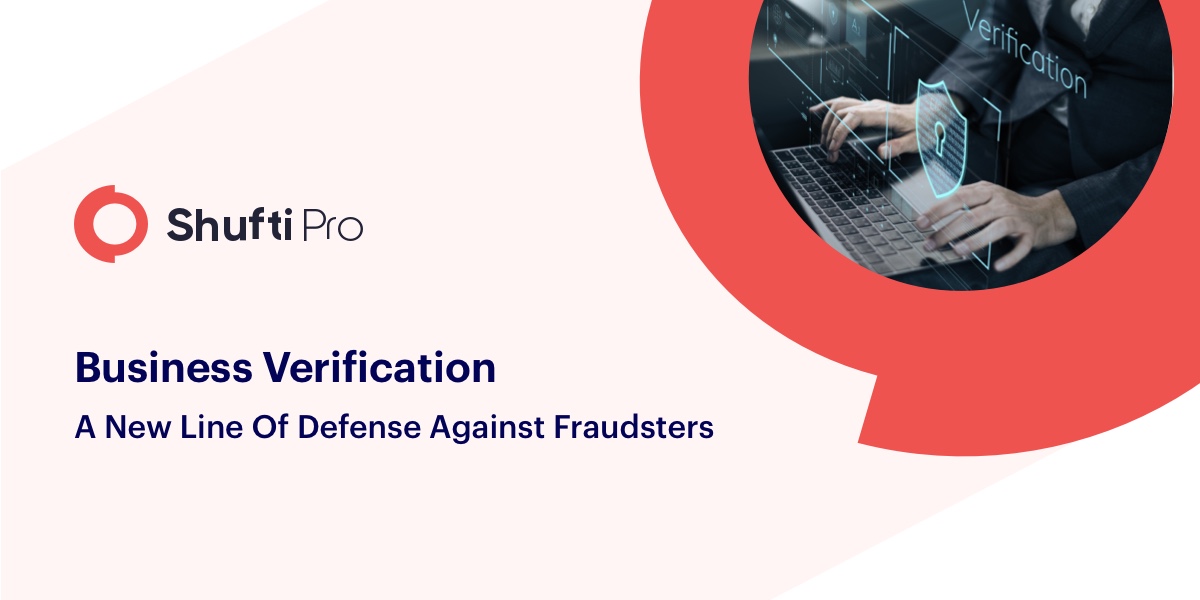Business Verification: A new line of Defense against Fraudsters

With the ever-increasing complexities of anti-money laundering (AML) and counter-terrorism financing (CFT) regulations and the increasingly global nature of the financial sector, banks and other financial sectors are spending a notable budget, time and effort to comply with AML and CFT regulations.
By the time the financial institutions and regulators catch up with the latest criminal tactics using advance technologies and airtight regulations – the criminals are already implementing more advanced methods to carry out financial crimes. Because of the obligation to constantly upgrading against fraudsters, it is always an ongoing challenge for the financial institutes to stay a step ahead of criminals and regulatory authorities. But how do they manage to do that? Attaining a commendable knowledge of Know Your Business (KYB), Know Your Customers (KYC) and AML regulations is a good point to start.
While KYC is not new, businesses know all about KYC and are constantly adopting new technologies to make the KYC process smooth and accurate, KYB, on the other hand, is a comparatively new phenomenon and demands financial institutes to put some extra effort.
A report published by OWI labs intimates that KYB verification, a $5.6 billion market in 2017 is expected to grow to $11.8 billion in 2022. Meanwhile, after the Panama leaks scandals, the regulatory demand for global business verification heats up in the US, Europe, Japan, Australia, Singapore, and many jurisdictions.
These stringent regulations have made customer onboarding a complicated process. While these requirements can look complex and demanding to the financial sector but implementing them is certainly useful for financial sectors to defend against fraudsters. The tactics and techniques of financial criminals are evolving. It is not sufficient to keep pace with regulatory requirements only, the financial sector needs to stay on top of the game.
What is Know your Business (KYB)?
Know your Business or KYB is a subset of KYC that emphasizes on the identity verification and risk assessment of a firm’s business clientele. Owing to the strict regulatory structures, verifying businesses is compulsory for financial institutions.
What is KYB and Why is it considered a shield against Financial Criminals?
Although, it is impossible to eradicate fraud once and for all. Same as a weed that grows wild and couldn’t be erupted for good, financial criminals continuously keep finding the vulnerability in the system. Equipped with AI and Machine learning, FinTech is assisting the financial sector in this fight against financial criminals. Owing to changes in the regulatory requirements for verification of business, business verification services featuring Artifical Intelligence are proposed by the FinTech industry.
Main Drivers of Business Verification Services
Artificial Intelligence
The main drivers of global business verification services are the increase in focus on thorough due diligence of the businesses and beneficial owners from regulators in Europe and the United States. Moreover, compliance cost for the due diligence is very high and verifying businesses manually is not a time taking process.
AI-based global business verification technology can reduce compliance costs for the financial institutions while maintaining quality standards and enhancing the customer experience. Another feature that makes automated business verification services distinct and reliable is the global verification facility. While manual verification takes the time it is also limited to the jurisdictions. For instance, the 6th AML directive by the EU requires countries to maintain a central registry for the listed business entities.
Future of Know Your Business Verification
As discussed previously, criminals always come up with new tools and techniques. Although AI-based Identity verification services are assisting in the elimination of financial crimes but will it remain strong enough in the future? This is the question yet to be answered but it is too early to make assumptions.
BlockChain Technology
On the other hand, technology is constantly making the process and there are more efficacious innovations in the backup. One such technology is Blockchain. With blockchain technology, financial institutions would be able to secure and exchange client information without maintaining a central register. This will help improve the KYC and KYB process and will further reduce compliance costs.
The current technology is a bit exposed to data breaches and achieving compliance with GDPR is complex. Only a handful of KYB solutions providers are compliant with GDPR and other major data protection regulations. With the advancement in technology, the new methods are expected to enhance the financial security and risk management.
The technological revolutions are making positive improvements and are adopted to fulfill the requirements of financial institutions and in this era of digital competition and complex compliance requirements, businesses need to adopt a robust business verification service. By automating the business verification process, the financial institutes can easily verify the business entities when onboarding. In addition to this, compliance with complex regulations will become easier.

 Explore Now
Explore Now













